#action comics 1 value
Text
Fabergé Eggs: The Iconic Treasures of the House of Fabergé
Fabergé eggs are the absolute most perfect and costly bits of enhancing craftsmanship on the planet. These eggs were made by Peter Carl Fabergé, a Russian goldsmith of French beginning, who became popular for his mind-boggling craftsmanship and his ability to interest to make extravagant things for the Russian magnificent family. Today, Fabergé eggs are viewed as among the most important and sought-after collectibles, with probably the most popular models selling for a huge number of dollars.
Faberge eggs were first made in the last part of the 1800s and mid-1900s for the Russian Supreme family. The main egg was charged by Tsar Alexander III as an Easter gift for his significant other, Sovereign Maria Fedorovna, in 1885. The egg was made of gold, plated in white, and had a little brilliant hen inside, which thusly contained a jewel scaled-down of the supreme crown. The progress of this first egg prompted the commission of 49 additional eggs throughout the following 32 years, with each egg turning out to be more perplexing and elaborate than the last.
Each Faberge egg was special and contained a shock or secret fortune inside. A portion of the eggs had scaled-down clocks, while others contained smaller than-usual representations or even whole music boxes. The eggs were made of gold, platinum, and valuable stones, with perplexing plans and hand-created subtleties that made them genuinely exceptional. The quality and craftsmanship of these eggs were unrivaled, with each egg requiring a while to make.
Fabergé eggs have become very important throughout the long term, with the absolute most well-known models selling for a huge number of dollars. The most costly Faberge egg at any point sold was the "Winter Egg," which was sold by the Forbes family in 2002 for $9.6 million. This egg was made in 1913 and highlighted a minuscule model of a sled, made of gold and precious stones, with a representation of the tsarevich inside. Other popular Fabergé eggs incorporate the "Crowning ceremony Egg," which was made to remember the crowning ritual of Nicholas II in 1896, and the "Magnificent Crowning liturgy Egg," which was made to praise the royal celebration of Tsar Alexander III in 1887.
The cost of a Fabergé egg can change enormously contingent upon its unique case, condition, and verifiable importance. A few eggs have been lost or obliterated throughout the long term, while others have been gone down through families or sold at sell-off. Today, it is assessed that there are just 43 known enduring Fabergé eggs, with a considerable lot of them held in confidential assortments or galleries.
The Faberge egg price can vary greatly depending on factors such as its age, rarity, condition, and provenance. Some of the most valuable eggs are those created for the Russian Imperial family, which are extremely rare and can fetch tens of millions of dollars at auction.
As of late, there has been a restored revenue in Fabergé eggs, with gatherers and financial backers anxious to procure these uncommon and significant bits of history. A few specialists foresee that the worth of Fabergé eggs will just keep on rising, creating them a shrewd venture for the individuals who can manage the cost of them. In any case, for a great many people, Fabergé eggs stay an image of extravagance and craftsmanship, an object of marvel and excellence that is past the span of customary humans.


#auction news#latest auction news#auctiondaily#artwork#art#auction#auction house#artist#action comics#action comics 1 value#auction calendar#faberge egg price#faberge egg#fabergee eggs
2 notes
·
View notes
Text
Maybe it’s just me, but family ties and status don’t really mean jack when the way you interact with your family members/loved ones is abusive (and by default, utterly unacceptable).
#kelseethe#it seems like you’re just picking on semantics and dodging the point people are trying to make#nobody but dc denies that Jason was officially adopted by Bruce and that he’s considered Bruce’s son#(both legally and because of the relationship they had/have)#but if the last time a parent acted like a loving parent was literally over a decade ago#and ever since he’s just been meddling and disruptive and overall leaving pain and chaos in your life for years now#(which Jason fans have to witness in practically all his comics because Bruce just has to make an appearance at least once every time)#then is it really a reach for people to point out that them trying to constantly force these characters together#(at the expense of Jason’s mental well-being and his values. every single time. it’s never Bruce compromising.)#is it really a reach for people to say this feels forced and that we don’t want to see this family dynamic#because 1. we don’t constantly wanna see our fav get invalidated and#2. have his stories be limited because of his ties to a family whose love and acceptance is at best conditional#because they only ever use him being part of this ‘family’ as an excuse to police his morals and actions#while he never actually recieves the love and respect that comes with being a son and a brother
13 notes
·
View notes
Text
Types of side characters
1. Foil Characters: These side characters are designed to contrast with the main character, highlighting their qualities or flaws. Foil characters can provide a different perspective and challenge the main character's beliefs or actions.
2. Mentors or Guides: These side characters serve as mentors or guides to the main character, providing wisdom, guidance, and support. They often have more experience or knowledge in a specific area and help the main character navigate challenges or learn important lessons.
3. Comic Relief Characters: These side characters bring humor and levity to the story. They provide comedic relief during intense or serious moments and can help balance the overall tone of the narrative. Their wit, clumsiness, or unique personality traits make them enjoyable and entertaining.
4. Love Interests: Love interests are side characters who are romantically involved with the main character. They add a romantic subplot to the story and can contribute to the main character's personal growth and development. Love interests can be supportive, challenging, or even create conflict within the narrative.
5. Antagonists or Villains: Side characters can also take on the role of antagonists or villains. They oppose the main character's goals and create conflict and tension in the story. Antagonists can have their own motivations, complexities, and backstories, making them more than just one-dimensional obstacles.
6. Friends or Allies: These side characters are the main character's companions, friends, or allies. They provide emotional support, camaraderie, and assistance throughout the story. Friends or allies often share common goals and values, and their relationships can help showcase the main character's growth and strengths.
7. Family Members: Side characters who are family members of the main character can play significant roles in shaping their identity and backstory. They can provide emotional connections, conflict, and a sense of history within the narrative.
8. Background Characters: While not all side characters have to be highly developed, background characters help create a sense of realism and immersion in the story. They populate the world and add depth to the setting, even if they have minimal impact on the main plot.
9. Rivals or Competitors: These side characters compete with the main character, pushing them to improve, overcome obstacles, or achieve their goals. Rivals or competitors can be a source of conflict, motivation, and personal growth for the main character.
10. Witnesses or Observers: These side characters serve as witnesses or observers of the main events in the story. They may provide insights, commentary, or serve as a narrative device to convey information to the reader.
#writing#writer on tumblr#writerscommunity#writing tips#character development#writer tumblr#writblr#writing advice#oc character#writing help#creative writing#side characters
5K notes
·
View notes
Text
Fuck it I'm bored so here's a ranking of different Peter Parkers by how Jewish they are
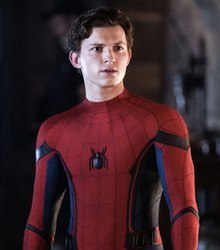
Dead last, obviously, is MCU!Peter Parker. This version of Peter is the farthest from comic canon to the point of being almost unrecognizable at times. Also, Tom Holland answered the question "is peter parker Jewish" in a Wired Autocomplete Interview a while back with a very baffled "no", cementing him forever as my sworn enemy. So he's actually the only peter parker who, at least by word of God, is canonically NOT Jewish. -1000000/10
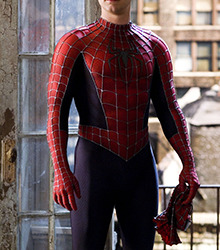
Next up is Tobey Maguire's Peter Parker. I think this Peter is... fine, at least he's much closer to comic canon than MCU!Peter, but honestly that's not saying much considering how far the MCU strayed from comic canon or even the spirit of comic canon. But like overall, Sam Raimi's movies just aren't particularly interested in presenting Peter as Jewish, so, eh. 1/10
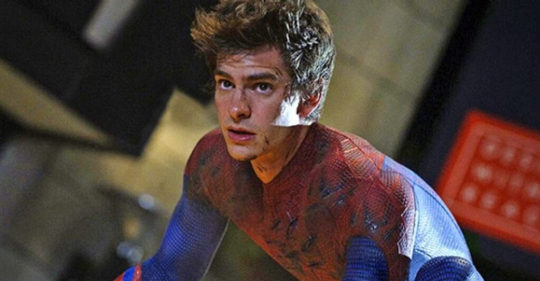
By far the most Jewish of live action Peters is TASM!Peter, also by far the most comic accurate of live action Peters. I'd be remiss not to mention the fact that Andrew Garfield is Jewish, and he understands the character so fucking well. He stated on record that he played Peter as Jewish and that he sees Spider-Man as an inherently Jewish character:
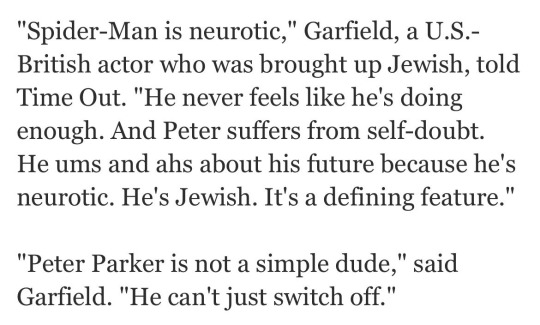
However, the Webb movies still do not textually define him as Jewish, and the best parts of Andrew's Peter's Jewish subtext are better when viewed in light of the comics. Overall, 6.5/10
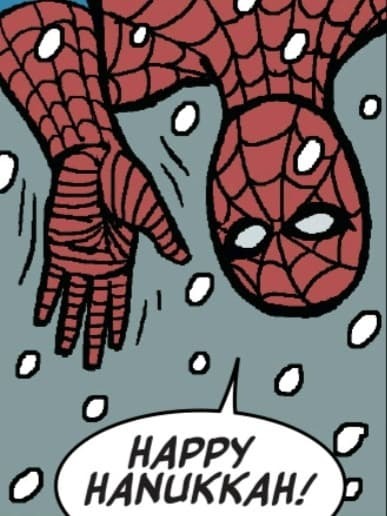
Next up is the original, our beloved comic book Peter, pictured here saying Happy Hanukkah in a panel from Matt Fraction's Hawkeye. Comic Peter is one of the most heavily Jewish coded comics characters of all time, which is saying something considering how Jewish comic books are as a medium. Obviously he was created and often written and drawn by Jewish writers and artists, but beyond that his driving ethos and values are incredibly Jewish, and as a bonus he's constantly sprinkling Yiddish and Jewish phrases into his speech, alongside things like the above panel where he outright acknowledges Jewish culture in a scene where everyone else is saying merry Christmas. However, despite the extremely heavy coding, Marvel Comics are fucking cowards, and he has yet to be confirmed Jewish, so I must give him a measly 8/10.

Finally, the cream of the crop, the most Jewish of all Peter Parkers, Into the Spider-Verse's Peter B. Parker my beloved!!! Peter B. is voiced by Jake Johnson, himself a Jewish actor, and is a phenomenally accurate representation of comic book canon - but he also has the unique quality of being canonically, textually, in the actual movie Jewish! It's a bit of a blink and you'll miss it scene, but when we get introduced to Peter B. in his "one more time" segment, we see his wedding to MJ, where he steps on a glass. This is a Jewish minhag - custom - meant to represent the destruction of our Temple and Jerusalem, as well as remind us that sorrow and joy come intertwined, and is one of my personal favorite Jewish customs. It's a phenomenal moment in the best Spider-Man movie, and while this version of Peter would have been my favorite film version regardless, his Jewishness absolutely pushes him even further up. 13/10, no complaints
#jew tag#jumblr#comics#marvel#marvel comics#spiderman#peter parker#peter b parker#spiderverse#into the spiderverse#tasm#sam raimi#the amazing spider man#mcu#gail speaks#jewish superheroes
16K notes
·
View notes
Note
How to get into the mind of a character? Honestly this can be for your OWN character or a fictional character. I'm wanting to write for characters- headcanons and fanfictions- and I'm so afraid I'll write them so uncanny to how they actually are.
How to get into the mind of a character?
To get into the mind of a character, you have to understand that character, believe in that character, and even "live" the character's life. But we all know each individual is different, and we cannot live different lives. A normal person who grew up in peacetime cannot fully understand the hardships of a warrior, and a doctor cannot know the thoughts of a mafia boss.
So, how can writers create believable characters? How can they possibly offer a believable soldier, cop, detective, alcoholic, or any given character type if they themselves haven't lived as them? How can they possibly offer a believable character in a situation that they've never been in?
Here are some tips you can use to get into the minds of characters:
Tip 1: Observe real-life people
To create well-rounded characters, observe real people around you. Pay attention to their behaviors, mannerisms, speech patterns, and thought processes. Take note of how they express emotions, handle conflicts, and make decisions. Drawing from real-life observations can add depth and authenticity to your characters. You can also search for novels and movies with different themes, study how characters with different pasts, biographies, occupations, and personalities act, behave, gesture, and speak. The best way is to prepare a small notebook and a pen so you can carry it with you wherever you go.

Tip 2: Create a detailed character profile
Develop a detailed character profile that includes information such as their age, background, beliefs, values, goals, and fears. Consider their relationships with other characters and how these dynamics influence their thoughts and actions. Delve into the character's past and explore significant events that have shaped them. Consider their upbringing, traumas, successes, and failures. These can provide you with a roadmap for understanding the character's mindset.

Tip 3: Use internal monologues and journaling
Imagine the character's internal thoughts and dialogues with themselves. Consider what they might be thinking in different situations, their hopes, dreams, and fears. (And why do they dream of that? Why are they afraid of that thing? What in the past made them afraid? Always asking questions.) Writing internal monologues or journal entries from the character's perspective can help you delve into their mindset and gain insight into their unique voice.

Tip 4: Consider their external influences
Characters are influenced by their environment, culture, and society. Reflect on how external factors such as family, friends, societal norms, or even the story's setting impact their thoughts and behaviors. This will help you portray their worldview more accurately.
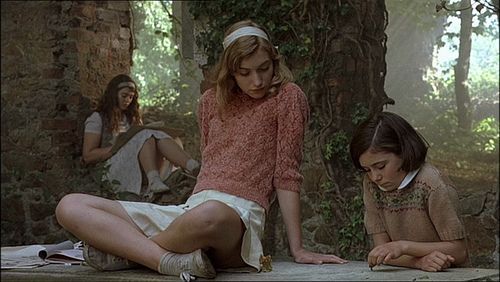
Tip 5: Study the source material
If you're writing about an existing character from a book, TV show, or movie, immerse yourself in the source material. Pay attention to their dialogue, actions, and interactions with other characters. Take note of their personality traits, motivations, and backstory. This will help you develop a strong foundation for understanding the character. For example, recently I suddenly became interested in Nightwing (do you know him? Nightwing from the Batman series!), and I wanted to write a few short stories about him. So I found all the comics and movies that featured Nightwing and watched them one by one. I don't take notes because I have a pretty good memory (especially for characters I like), but I still recommend taking notes on special things to note.

Tip 6: Practice free writing
Set aside time for free writing exercises where you write from the character's point of view. Allow your thoughts to flow without judgment or editing. Just write, write, and write. You can reread and make corrections after you're done. Remember to gather your posts in one place; otherwise, you'll lose or forget them (like me!).
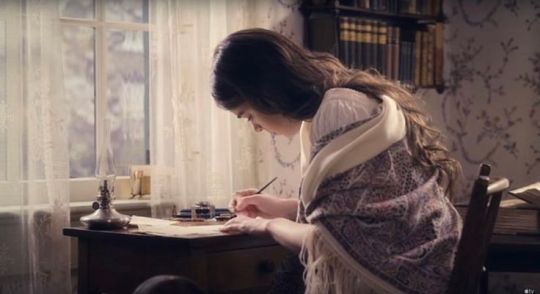
Getting into the mind of a character is an ongoing process that requires continuous exploration and refinement. The more you invest in understanding your character's thoughts, feelings, and motivations, the more compelling and authentic your writing will become.
Additionally, you can read my articles on how to write an effective character here:
How to create a superbad villain
How to make a villain's appearance memorable
Basic questions for your character
Describing a villain's appearance in a natural way
Create an effectively past for character
Common character motivations
How to create a good main character
How to avoid the instance where a secondary character stands out more/ is more lovable?
Character flaws
Writing a good Anti-Hero
Character positive traits
How to write an elderly main character?
Protagonist who is a ballerina
How to write a believeable egotistical character
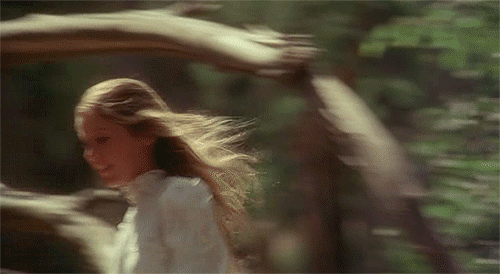
#writerscommunity#writers#writersociety#writer things#writeblr#writers on tumblr#on writing#writing#creative writing#writblr#writings#writer#words#write#writers and poets#women writers#ao3 writer#amwriting#author#writers life#female writers#writing stuff#writer stuff#writing resources#writing requests#writing reference#writing rambles#writing romance#writing a book#writing community
178 notes
·
View notes
Text
Okay. I've been playing Tokyo Debunker today, since the release happened to catch me on a day when all I'd planned to do was write fanfiction. I just finished reading the game story prologue (it was longer than expected!), so here's a review type post. If you're reading this post not having seen a single thing about this game: it's a story-based joseimuke gacha mobile game that just released globally today. It's about a girl who suddenly finds herself attending a magic school and mingling with elite, superhuman students known as ghouls. If you look in the tumblr tag for the game you'll see what appears to be a completely different game from 2019 or so: they retooled it completely midway through development, changing just about everything about it due to "escalating competition within the gaming industry."
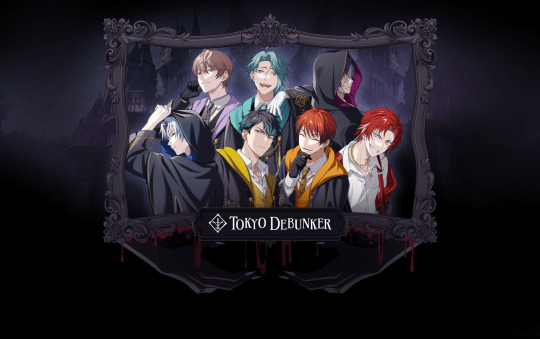
I'll talk about how this looks like a blatant twst clone at the end.
Starting with the positive: The story is charming. I enjoyed it thoroughly the entire time and am excited to read more. The mix between visual novel segments and motion comics was really nice--it broke things up and added a lot of oomph to the action or atmospheric scenes that visual novels generally lack. I like the art in the comic parts a lot. the live2d in the visual novel parts is... passable. Tone-wise, I think the story was a little bit all over the place and would like to see more of the horror that it opened on, but I didn't mind the comedic direction it went in either. The translation is completely seamless. The characters so far all have unique voices and are just super fun and cute. Of the ones who've had larger roles in the story so far, there's not a single one I dislike. It's all fully voiced in Japanese and the acting is solid. (I don't recognize any voices, and can't seem to find any seiyuu credits, so it seems they're not big names, but they deliver nonetheless.) Kaito in particular I found I was laughing at his lines a ton, both the voicing and the writing.
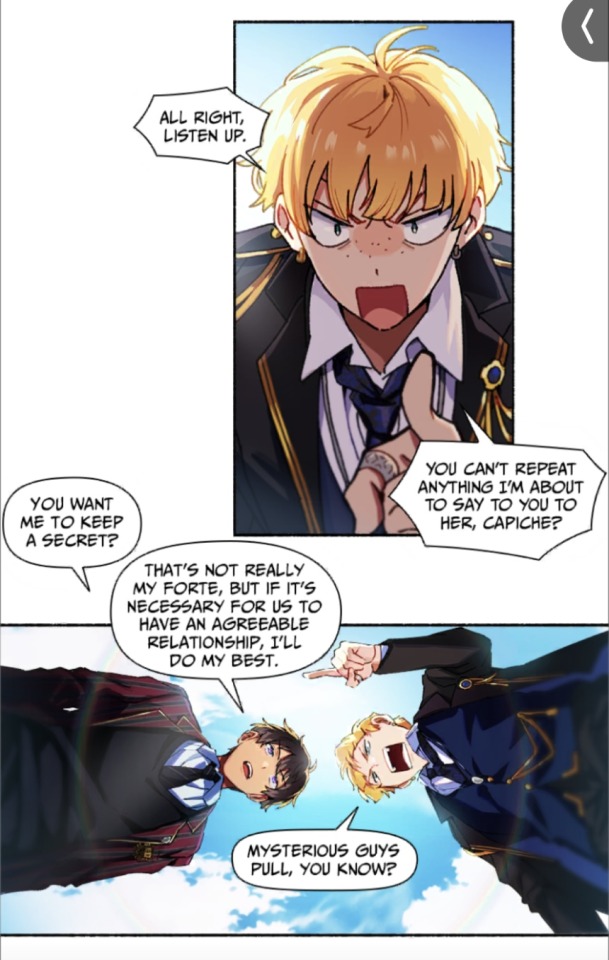
He's looking for a girlfriend btw. Spreading the word.
The problem is like. The gameplay is the worst dark-pattern microtransaction-riddled bullshit I've ever seen. Hundred passive timers going at all times. Fifty different item-currencies. Trying to get you to spend absurd amounts of real world money at every turn. There's like five different indicators that take you to various real-money shop items that I don't know how to dismiss the indicator, I guess you just have to spend money, wtaf. Bajillion different interlocking systems mean you have zero sense of relative value of all the different item-currencies. I did over the course of the day get enough diamonds for one ten-pull, which I haven't used yet. Buying enough diamonds for a ten-pull costs a bit under $60 (presumably USD, but there's a chance the interface is automatically making that CAD for me--not gonna spend the money to check lmfao), with an SSR rate of 1%. BULLSHIIIIIT.
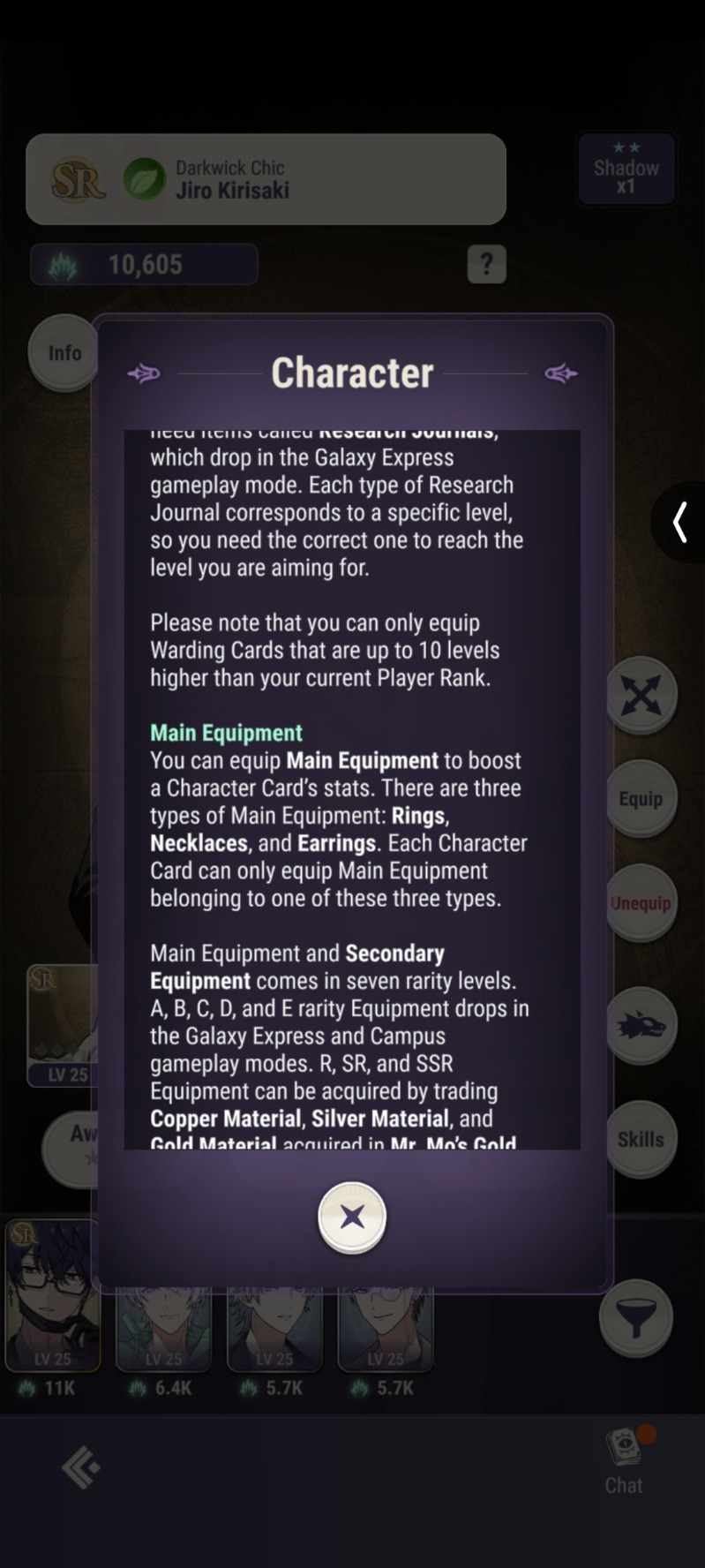
There's like a goddamn thousand-word essay explaining the dozen different types of character upgrades and equippables and equippables for the equippables!! Bad! Bad game design! That's just overcomplicating bullshit to trick people into thinking they're doing something other than clicking button to make number go up! That is not gameplay!
In terms of the actual gameplay, there is none. The battle system is full auto. There might be teambuilding, but from what I've seen so far, most of that consists of hoping you pull good cards from gacha and then clicking button to make number go up. There's occasional rhythm segments but there's no original music, it's just remixes of public domain classical music lmao. I'd describe the rhythm gameplay as "at least more engaging than twisted wonderland's," which is not a high bar
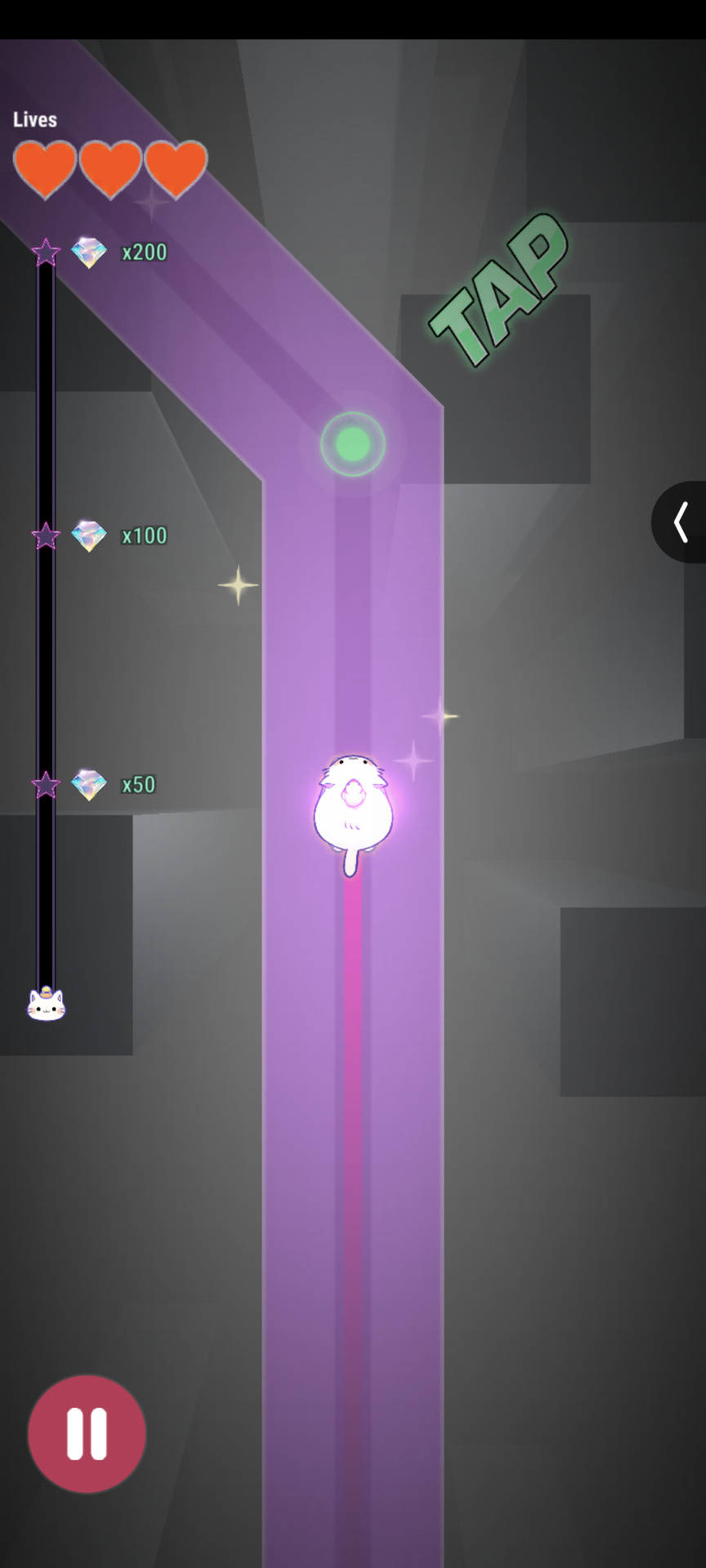
At least there's a cat in the rhythm bit.
And like, ok, I gotta remark on how derivative it is. Like I mentioned in my post earlier, this game is unabashedly aping twisted wonderland's setting and aesthetic. (That said, most of the stuff it steals from twst is magic school stuff that twst also basically stole from Harry Potter, so...?) However, it isn't exactly like twst: in this one, the characters say fuck a lot and bleed all over the place and do violence. Basically, the tone is a fair bit more adult than twst's kid-friendly vibe. (Not, like, adult adult, and I probably wouldn't even call it dark--it's still rated Teen lol. Just more adult than twst.)
Rather than just being students at magic school, the ghouls also go out into the mundane world to go on missions where they fight and investigate monsters and cryptids. Honestly, the magic school setting feels pretty tacked-on. The things that are enjoyable about this would've been just as enjoyable in about any other setting--you can tell this whole aspect was a late trend-chasing addition, lmao. So, yeah, it's blatantly copying twst to try to steal some players, but... Eh, I found myself not caring that much. Someone more (or less) into twst than me may find it grating.
Character-wise, eh, sure, yeah, they're a bit derivative in that aspect too, but it's a joseimuke game, the characters are always derivative. Thus far the writing & execution has been solid enough that I didn't care if they were tropey. If I were to compare it to something else, I'd say the relationship between the protagonist and the ghouls feels more like that of the sage and wizards in mahoyaku than anything from twst. There's some mystery in exactly what "ghouls" are and their place in this world that has me intrigued and wanting to know more about this setting and how each of the characters feels about it. I have a bad habit of getting my hopes up for stories that put big ideas on the table and then being disappointed when they don't follow through in a way that lives up to my expectations, though.
So, my final verdict: I kind of just hope someone uploads all the story segments right onto youtube so nobody has to deal with the dogshit predatory game to get the genuinely decent story lol. Give it a play just for the story if you have faith in your ability to resist dark patterns. Avoid at all costs if you know you're vulnerable to gacha, microtransactions, or timesinks.
#suchobabbles#Tokyo Debunker#it's a global simultaneous release so I'm curious to see how it ends up doing in Japan#it's gonna be competing directly with stellarium of the fragile star which releases in a few days lmao. and is about a magic alchemy school#looks like the two games twt accounts have a similar number of followers#and then theyre competing with bremai releasing in may...#also adding this at the very end since i cant confirm anything:#but i found out abt this game bc it was rt'd by the former localization director/translator of A3en#i dont know if she worked on it or maybe her friend or maybe shes just hype! who knows! but i think her word (or rt) is worth something
114 notes
·
View notes
Note
I see a lot of people start with grays calendar for their art and then color it in, and I wanted to ask how you do that?
i do it manually! i use the lasso fill tool in clip studio paint and fill in figures and other important details as I finish the linework. everything in a panel gets a separate grey tone based on foreground, middleground and background. Unless I'm lazy, I usually try to match the tones to the value structure I actually want for the panel in the end, ie whether the figure or the BG is the darkest thing in frame.
i do this to make my job easier when I have to color, because I can clip all my flat colors and shading to the base layer, and I don't have to worry about being precise. I actually made an auto-action in clip studio recently that automatically creates and clips the shade/light layers to the base for me, it looks like this:
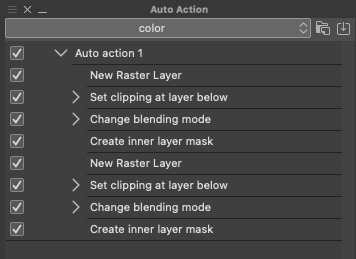
it saves so much time. if ur making a comic where u have to do the same things 1 million times I highly recommend looking into auto-actions
#ask#bonus content#directors commentary#i could probably even use an auto action to fill things for me too but my linework is too sketchy sometimes for it to work properly#so I do it myself#also all the auto action does is make the layers themselves I still have to like. draw in them lol
125 notes
·
View notes
Note
Your post about that dialogue from Gotham Knights (the game) made me think back on how much I miss Bruce and Dick's relationship tbh. Like obv it was never the healthiest thing ever, and Bruce was always emotionally constipated, but it always felt a little more... equal? Recently it's just felt so toxic, like Bruce will be an asshole, and Dick will be hurt by it but will still come back to him and will remove the burden of Bruce apologizing for anything from him. Like the scene between them in Nightwing 100, where Bruce is rightfully apologizing for his crap and Dick says he doesn't have to. I do like that scene (even if it was over the top), but that's not right. Like, no sir, he has a lot to apologize for lmao. But that's literally been their dynamic for so long. Whenever Bruce should be called out, Dick just forgives him and Bruce goes back to doing the same old shit again, and Dick forgives him again, and rinse and repeat.
Honestly, it feels like whoever wrote those scenes took a look at that one meme of Batman slapping Robin and said "hey, they like that, let's do that!" Like, you can't go a long time without Bruce hitting Dick. Because they think fans eat that shit up ig. They are so attached to their shock value Bruce and Dick fights and their image of brooding Bruce that they won't address their fucked-up relationship and won't change the status quo. We have gotten many scenes of them being great together and having sweet moments, but those all feel tainted by the rest of it. It's as recent as the amnesia arc where Bruce re-traumatized Dick and then didn't help him when he was living in his car and then pretty much emotionally manipulated him to become Nightwing again. Recent comics really have forgotten what Batman is about.
And it sucks, because Dick is my fave of all faves, but I also love the hell out of Bruce Wayne, and it's so sad to see him be reduced to this... only brooding, borderline abusive asshole. They won't let him grow or develop. I don't mind conflict, and I like that they have a complicated relationship. I didn't even mind Bruce punching Dick, because it's interesting. Once was fine, twice was fine, the same thing happening all the time without addressing it and with no change across years is kind of a problem. I'm only keeping up with the Nightwing run out of loyalty to my boy, but from what I've heard of the events that are happening outside of that, it seems that they are having issues again, and I'm waiting for the next Batman issue that features Nightwing to also feature another punch or something. It's always Bruce being coddled by the story and never being asked to make the step forward, it's always Dick that has to give in and make Bruce feels better about his flaws and free him of any responsibility for his actions even when it's time for Bruce to step up and grow up.
It's why I prefer the animated adaptations or the retellings. I think world's finest did a good job with their relationship, I feel like Robin: Year 1 from back in the day did too, and Young Justice animated for its many flaws has a solid dynamic between them. They still have a complicated relationship, but it isn't so dramatically awful. It allows for a more balanced and well-rounded portrayal of the character when you aren't pandering to some people by flanderizing the character ig. Anyway, sorry for ranting, you're like my fave Dick Grayson blog so I just wanted to share. Hope this wasn't a bother.
No yeah I hated that aspect of Nightwing #100. If TT wanted to do a scene like that, he should’ve built up a conflict between Dick and Bruce to give us some context as to some type of thing Bruce actually needed to apologize for. Then he could’ve had Bruce apologize, Dick accept the apology, and end it with that reconciliation.
Instead, he just had Bruce apologize like, “I’m sorry I failed you, I’m sorry I pushed you away, I’m sorry if I ever made you feel like I wasn’t proud of you,” which would’ve hit much harder if, again, they had shown some kind of recent conflict between Bruce and Dick to warrant that sudden apology. And for Dick to then express his own hurt and such over said conflict. And then for them to come to some reconciliation. But yeah it’s very unsatisfying for Bruce to just list things he’s sorry for, and for Dick to hug him and just reassure Bruce. Like nooo let Bruce feel bad. Let Dick feel bad because of what Bruce did to him. Let Dick be angry. Let them both hurt. Then let them heal.
As for the amnesia arc, I feel like they really did a disservice to Bruce by not focusing enough on his trauma from the sniper incident. If they really stressed how much it traumatized him and then showed how his actions were effected by that (like giving him a dire need to have Dick return to normal bc otherwise it’s like Dick just died in his arms on that rooftop) then that is much more sad and compelling, and we can at least kind of see where Bruce is coming from by showing Dick the sniper video (though it would’ve been better if they just… hadn’t done that all).
If I had been writing that issue, I would’ve had it from Bruce’s POV where he would’ve constantly been in a state of flashbacks. Like seeing his parents getting killed and then comparing it to Dick getting shot. And then having flashbacks of Dick when he was younger but then Bruce imagining that Dick keeps getting shot in the head in each of those memories. And all of that literally just like… pushing Bruce over the edge. And then of course when Dick wakes up and asks Bruce “Who are you?” Bruce spirals even further. And we see his descent to this very isolated and dark place where he just wants his son back at all costs. That would’ve been waaaaay more interesting. Extremely dark ofc. But interesting.
Yeah the comic Dick and Bruce relationship can definitely be toxic (and I’m not totally opposed to that bc I think it makes things interesting between them), and there are animated shows that show them in a more balanced light. The Batman (2004) is one of those shows as well. Dick was Robin then ofc, and Bruce wasn’t so dark at that point in life. But when you watch shows like that, it reminds you of the character Bruce is supposed to be, and it reminds you of what you like the most about him. So definitely nice to watch shows like that sometimes to remind yourself of the Bruce Wayne that exists outside of modern comics.
58 notes
·
View notes
Note
The latest ending of Ahsoka really made me realize one of the big problems with Felony's writing and why so much of the Masndo-verse and Felony's modern writing falls flat compared to OWK and Andor. Shock value. A BIG twist cliffhanger that leaves us all mouth open and HYPING up the next episode in hope and filling the forums with discussions in anticipation. Understandably, he can't write what we wrote in our heads for 7 days and top that. 1.
2. But once that shock is gone when the story has moved onto the next big thing, or you watch it again when you know what it pays off in, or watch the whole series or season again, it just doesn't hold up. It's empty. Vapid. Because it's all about the shock. The twist. The discussion. The hype fodder. It's not saying anything or adding anything. OWK and Andor was a lot better at that, without the use of the nostalgia baiting that Felony relies on.
3. It becomes an endless circle of low lows and high highs, while OWK and Andor both slowly built up to the crescendo of discussions and speculations and both have stayed in the fandom consciousness alot longer thanks to that. And because they have something to say, both to the world and to the viewer. While with the Felony and the Fraudrou verses, it's just a constant barrage of oh wow, moving on, what's next? ehh, it's over, let's move on.
I feel like one day I'm going to do a longer analysis on why exactly Filoni's writing feels weak to me (where I try to be more fair than I'm usually feeling about his writing), because I don't think he's without a lot of talent and there's certain things he really does get about Star Wars, but I think so much comes back to that he's a writer who is caught in a difficult position--playing in someone else's sandbox but has to now establish his own new corners of that sandbox and I'm not sure he's strong enough to be a big picture kind of guy when he works better in smaller focus.
His work on TCW and Rebels is content that we do come back to again and again for analysis, during my rewatches of both those series, those shows hold up! But I think they're ones where he had stronger guardrails up, and he was forced to stick to things in one place.
I think live action has been bad for Filoni's writing because of the way so much is structured, that there are multiple series going on and I feel like his writing doesn't have the patience to actually tell a story in a single space, that's why we get Grogu's story being split between The Mandalorian and The Book of Boba Fett, that's why we get Mandalore's story being splintered across Rebels, The Mandalorian, The Book of Boba Fett, and now Ahsoka. We still haven't even seen half of the events that happen in the Mandalore bigger story!
And you're right that he and Favreau both lean too hard on the cameos and echoes/rhymes for nostalgia's sake. And those reference points are often extremely fun in the moment! And I'll grant that the Luke episodes are ones I go back to fairly often, because I think there's some really good content in there about what attachment actually means.
But I don't think it's that surprising, looking back, how quickly the Favroni shows fell apart for us and how it doesn't feel like they're establishing anything that can support a bunch of books and comics. I suspect that Disney's not allowed to have books/comics/etc. based on Favroni's shows because they want creative control over those characters while they're still actively writing for them, but also I look at the OT and the PT and look how much was built off those movies+TCW as a foundation, I look at how much you're able to still watch those and find new things to analyze, and I just don't feel that with Filoni's writing anymore, not since Rebels, not to that level, anyway.
(I'll grant that I've been a lot more excited about the Ahsoka series and what we can say about it/find in analyzing it than I expected, I expected nothing but shitposts like we did with Mandalorian s3, but I've had fun with serious meta in Ahsoka! I was genuinely excited to come on-line after episode 4 and talk about themes and structure and how well Filoni did with that there!)
Ultimately, I think Filoni (and Favreau) both have a lot of talent, but I think they're being pushed too hard to make too much too quickly and that it shows that they're making this up as they go along, rather than that they had a vision they've been crafting for years and any kind of idea of where they want the end goal to be. Like, yeah, Lucas wrote some stuff on the fly, he changed his mind about things along the way, but he had an end point in mind for his story, so the echoes/rhymes felt more resonant for me. Favroni don't feel like they have any idea where they're going and so much winds up feeling like shock value and self-reference for nostalgia bad for me instead of something that's Going Somewhere.
144 notes
·
View notes
Text
I know this is supposed to be an AngstyTM experience for all involved but frankly??? This should have been an action/romcom made in the 90s.
Break for The Worst of Evil spoilers:
The plot is so hilarious - going undercover so you can live up to your hotshot cop wife ONLY to find that the mafia don you’re spying on was your hotshot cop wife’s ex??? Who still loves her? And not only do you have to pretend it’s fine when it’s not, but you have to actively help him get your wife? And it’s your job to save his life which you’ve done several times so he’s imprinted on you like some kind of murderous duck?? How was this not the premise of a comedy starring Jung Woo-sung as a mafioso, Lee Jung-jae as the underachieving cop going undercover and Kim Hye-soo as the hotshot cop they’re both in love with?
(Things in Worst of Evil’s favour: Im Semi, who is really lovely; supporting actors like Im Seong-jae and Lee Shin-ki who elevate the joint. Ji Seung-hyun is also in this; his hair is doing the Lord’s work.
Also give it up for the scenes at Euijeong’s mama’s funeral, which should have played like a French farce but did not because everyone is taking this very seriously. The sheer comic value of Ji Chang-wook at his own mother-in-law’s funeral, his head lowered like no one would recognise him if he did that, and then almost getting outed by a random nephew! Said random nephew getting picked up by Ji Seung-hyun so their cover doesn’t get blown! Ji Seung-hyun’s face is in Euijeong’s papers as her husband, so now Wi Ha-joon is like ENEMY NO. 1 IS HERE! Wi Ha-joon getting into it with Eui-jeong and trying to be a comforting boyfriend, until Ji Seung-hyun walks over completely unnecessarily to get some dickswinging in! All of this while Ji Chang-wook watches! Two men! Fighting! Over his wife! How is this not a French farce?
The amazing late 90s Motorola cell phones - I’m looking out for the Startac!)
#for clarity the mid 90s movie version#would have ended with everyone making out#because how else.#but anyway#the best undercover noir#was also made with jung jae ssi#and the lovely gremlin hwang jung min#and it was new world (2013)#i have watched the ending of that movie thirty times#because it is PERFECT#the worst of evil#gin text post
64 notes
·
View notes
Text
Action Comics 1's Auctions Background
Action Comics 1 is the principal issue of the first run of the comic book/magazine series Activity Comics. The 1938 comic, which denotes the primary appearance of Superman, is currently the third-most-costly comic ever. On June seventeenth, 2021, Legacy Sell-offs will offer a duplicate of Activity Comics #1 as a feature of its Comics and Comic Craftsmanship occasion. It will cross the block only two months after another duplicate broke the record for the most costly comic at closeout. Notwithstanding the beforehand referenced 200,000 duplicates brought to showcase, finding a gatherer grade illustration of action comics 1 value in 2021 is troublesome. "Kids read them, so the books got worn out.
Following an all around record-breaking year for the comic book, Legacy Sell-offs will offer one more duplicate of Activity Comics #1 this month (part #91001). As of composing, intermediary offering for the part is at $320,000 of action comics and Pricing
CGC grades this duplicate of Action at a 5.5, which the organization characterizes as "a somewhat better than expected collectible with a few moderate imperfections." Bidders ought to likewise take note of that some protection work has been finished on the comic. That incorporates new staples and a support of the cover. The comic book sold for $3.2 million after a 24-day bidding war. That price set an auction record for all comics books available at the time, not only for Action Comics #1.
#Action Comics 1#action comics#action comics 1 value#action#auctiondaily#auction news#artwork#art#latest auction news#artist
0 notes
Text

(Credit for the above image goes to the lovely and talented as ever @spider-jaysart who helped considerably co-create this character)
Meredith Adams Robinson
Age: 10 1/2 years
Height: 5’2”
Personality Traits: Adventurous, Intelligent with her Hobbies, Playfully Mischievous, Open Minded and Positively Receptive when Taking Genuine Criticism, Stands Up against Authoritarian Tendencies from some Grown Ups and Bullying from some jerkish classmates, Very Hard to Get Stressed Out, Easy Going, Conversely is Very Hard to Calm Down or Soothe when Agitated, Scared, or Angered, Never Runs From a Fight No Matter the Risks, Sometimes can be Impatient with certain things like upcoming news for her fandoms or with unpredictable delays in whatever her friends and her are doing that day.
Attends Bludhaven Academy, currently in 5th Grade
Only Daughter of Mackey Vernon Robinson, a local Bludhaven based Car Mechanic, and Susana Whitehead-Robinson, a US Marine currently stationed at Air Station Iwakuni in Japan.
Primary Hobbies: Making Short Films with her Phone’s Camera, cardboard miniature buildings and her collection of kaiju action figures as Practice for her Cinematography skills and stop motion animation, Writing Down Scripts and Story Treatments for Dream Movies, Comic Book Reading and Collecting, Gymnastics and Social Networking
Best Friends: Jake Grayson*, Thara Ak Var, Christopher Kent, and Mar’i Grayson
*Both Jake and Her are clearly developing feelings for one another despite insistence from the both of them of being merely just very close good friends
Bio: Raised by primarily her father due to her mother’s duties as a US Marine, Meredith Robinson takes a lot of her persona and approach to life from said father, who in turn always values making the best out of any sort of situation and looking to the bright side when possible. While not exactly entirely low class citizens, The Robinsons reside at a humble and modest neighborhood relatively close to both the slums and the dockyards, which in turn had Meredith for the longest time attending the less prestigious and even sometimes run down elementary schools prior to attending Bludhaven Academy for the fifth grade, even then it took insistence from her parents and a threat of lawsuit to the Bludhaven Unified School District to allow her in. With that, Meredith is a relatively street wavy sort who’s familiar with the rougher sides of the city, which ensures she can fend for herself and her f friends in times of danger, maybe even jump as a volunteer during fights being rouges and Bludhaven’s local crime fighters
Speaking of whom, Meredith first meets Jake Grayson during her first day at Bludhaven Academy, as both have picked Basketball for their PE Classes, difference here being Jake has been part of the Academy’s official peewee and later Junior teams ever since he was seven. Upon first laying eyes and beginning to talk to each other, a sort of emotional spark within them went off, as if their hearts grew by one or two sizes and they largely grew the very second they say hi to one another.
However, Both Meredith and Jake rather not dwell on those bidding emotions and feelings too much as the two don’t wish to pursue an immediate relationship of that sort with anyone. It just feels…wrong if they jump into a childhood crush right away. No, Meredith and Jake instead immediately start out being friends, quickly becoming close within the next two weeks after that first meeting. Within that time, Meredith then meets Jake’s best friend Chris and his Big sister Mar’i. What truly captures her eyes though comes when she’s introduced to one of Chris’ other school friends whom is a foreign exchange student from New Krytpon, Thara Ak Var. Other than Jake and despite going to differing schools, Thara and Meredith quickly form a tight knit and solid friendship with each other, Thara more sensible and typical girly approach balancing out with Meredith’s tomboyish attitude and adventurism quite nicely.
During the particular weekends after beginning her school year, a rampage by Cinderblock results in Meredith being precariously dangling off the rooftop of a building, each blow to it the stone monster causing more of its foundations to break. Finally as the building gives and just as Meredith was going down with it, she’s rescued from the crumbling rubble by one of those local heroes, swinging away to safety on a cable while being safely held in his arms. Meredith peaks open her eyes, revealing a young man about her age on a black domino mask and an assuring smile on him, Skybird. It’s only about six to ten months later and after further adventures with Skybird does he finally feel confident in her trust to not reveal his secret identity to those who don’t know, revealing himself as his best friend and classmate Jake Grayson.
After the tiny bit of silence in so both can process their thoughts and emotions after such a reveal, Meredith becomes a viable yet not distracting presence for Jake when hero duties are concerned. Her experience in the streets allows Meredith to catch wind of any sort of shenanigans and plots being done from the view point of the near lowest level which gives Jake and his partner Chris the intel needed for their never ending battle against the forces of evil. Akin comparatively to the portrayal of the character of Mary Jane Watson seen in the Insomniac SpiderMan games.
Oh and as the shirt she wear was major indicator and thanks to her mother’s continuous presence at Japan, Meredith and her Father have an entire collection of pretty much ever my single Godzilla movie, show or tv series ever made. Her dream is to one day create a kaiju movie of that caliber cause really it’s one of the great accomplishments as far as she’s concerned.
Misc Trivia:
- Absolutely Loves Blue Moon Ice Cream and is so ever thankful a local parlor near her place serves it. She’s considered something of a regular customer and the staff are alway so delighted to see her
- Besides Skybird, her favorite superheroes would be both Starfire and Troia. Some honorable mentions go to Batwoman, Batgirl (Cass) and Raven
- While generally easy going and hard to annoy, one particular quick way in getting there is continually poking fun at suitmation, the common method for special effects in the majority of the Godzilla and other kaiju movies. She’d very very quick in pointing out the hardships and difficulties the guys in those rubber suits had to undergo in making the best film they can, not limiting to exceptional high temperatures inside said suits, the risks of injury just by tripping and falling over the sets given the virtually useless eyeholes, risk of burns from the small sparks and controlled fires along many others. She respects those guys.
- She’s loosely based on the woman Jake had married and had a child with at the very end of Nightwing: The New Order. The general idea being the small childhood crush they develop grows over the years, developing into romance once they reach college and once they’ve graduated, then they’re a happily married couple
28 notes
·
View notes
Text
Why Was Alastor A Serial Killer?
I'm willing to bet that Hazbin Hotel is trying to avoid the true crime route of portraying serial killers with gritty 'realism'. Characters kill for theatrical reasons, not because the creative team is doing a deep dive into criminal minds.
I foresee Alastor's serial killer spree to be plot-spurred. Not because he's gonna be revealed to have antisocial personality disorder, or a psychopath, or something polarizing like that.
Realistically, any of the current Hazbin Hotel cast could have a personality disorder. Real-life serial killers aren't profiled (by USA FBI) to be more likely to have mental illnesses. After all, there are other serial killers than the ones you hear about most often. Serial killers are also the organized criminals, or abusive husbands, or political/religious extremists. They may or may not view their victims as fellow individual humans. They may or may not be influenced by bigotry.
Hazbin Hotel is a musical comedy first and foremost. It follows Loony Toons rules over Hannibal, or The Cell, or Silent Hill. It's possible that Alastor's serial killer past won't ever be a plot point. It's as relevant as any other character's reason for being in hell.
If his serial killer spree is ever addressed, I theorize it might be because:
They were magical sacrifices. Alastor's magical abilities take heavy hits from Hollywood 'voodoo'. One of the smear accusations against New Orleans' budding Vodou culture (especially against Marie Laveau of the Victorian era) were sacrificial rituals performed in areas like on the shores of Lake Pontchartrain. If Alastor was dabbling in magic during his living years, he might have killed and cannibalized solely for sacrificial reasons. Possibly involving his supposed 'deal', as well.
They were 'vigilante' targets. The lyrics in the pilot include the lines And we'll chlorinate this cesspool / With some old redemption flair. He values good manners. He doesn't believe in taking advantage of the weaker. One background concern of the Hazbin Hotel (and Helluva Boss) universe is the sheer number of humans who end up in hell, all equal in their sin. Like the angelic exorcists that descend to cull the herd, it'd be appropriate for a character to have a hand in playing a similar role whilst mortal. Or, at least, that's how he saw himself.
It wasn't spur killing, all the victims were connected. We've never had a full plot centered on why a soul ended up in hell. Canonical reasons have been revealed in side material, such as Angel Dust's organized crime and drug use. As the seasons continue, there may come a day where a character's mortal sins become very relevant. Many a protagonist has found themselves racking up a body count all of a sudden, thanks to his hero's journey. Perhaps that resulted in Alastor's notoriety.
Alastor was a living demon, and he consumed humans. His serial killing is one thing, cannibalizing his victims is another. He's obsessed with consumption and partaking in flesh. The pilot ends with his hunger for his mother's recipe. His side comic has him eating eggs at a cafe, then visiting Cannibal Town, then visiting a butcher to buy more food. He canonically dislikes sweets and is a snobby foodie that dislikes processed food. There's only three proper food scenes in season 1, and he's two of them - the deer, and when he eats other sinners in his monstrous form. If he made some sort of devilish deal while alive, perhaps the cost was the need for flesh. Thus gave rise to a human with inhuman bloodlust.
His reasons won't ever be revealed. Or, they'll be unimportant. We don't particularly care what gang Angel Dust ran with as a mafia grunt, and perhaps we're also meant to take Alastor's serial killing at face value. At of this writing, we poke and prod at the guy 'cause he's this huge mystery, but maybe we'll grow to care solely for his contemporary actions, and not for his backstory.
We may get our answer one day, but for now, he remains an enigma.
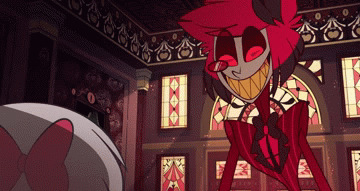
#alastor headcanons#alastor the radio demon#alastor#hazbin hotel#hazbin hotel headcanon#hazbin alastor
21 notes
·
View notes
Note
So if Superman is Moses and Captain America is David, do you think that Spider-Man is Job?
He's always miserable, with suffering piled upon suffering and loss piled upon loss. But he always has faith in the goodness of humanity and the righteousness of his duty. He maintains his faith throughout all of his trials, and that's what makes him a hero.
(I was thinking about how Judaism and Xianity see G-d differently, and more specifically how they see faith and obedience to G-d differently. In Judaism faith isn't about obedience, and G-d is often an allegory for the world just as the world is often an allegory for G-d — at least that's how I interpreted the fact that 90% of our prayers are thanking G-d for creating a specific aspect of material reality. So if the story of Job is, from a Jewish perspective, isn't about unwavering obedience to a single entity but instead about having unwavering faith in the goodness of the world, then it fits Peter Parker almost to a T, right?)
Wow ok I am SO pissed off that I wrote the answer to this for a full hour and now it's just fucking gone because Tumblr decided not to publish it when I hit post. What the very fuck. So I'm going to try to shorten what I wrote a little and hopefully it'll still make sense. But this is a great ask, for real.
Anyway. I feel like something that's been lost in my most popular posts is that my central thesis when it comes to the Jewish nature of superheroes is not that there's a 1:1 between every hero and a historical, mythological, or Tanakhi figure. The central thesis is, instead, that the very concept of heroism as presented in comics is tied to the Jews who created the genre; it's just very easy to demonstrate these kinds of concepts with direct allegories that have such clear parallels. I actually have a third secret parallel that'll probably never see the light of day, between Magneto and Aher (and like, does anybody even know who Aher is? he's not exactly a well known figure).
One of the reasons I haven't posted this comparison is that it is largely thematic, and therefore requires considerably more explanation, especially for goyim or those who aren't familiar with Aher's story (אלישע בן אבויה fyi if that means anything to y'all). But that's sort of my point - it's much easier to point that Superman is literally Moses and Cap and David serve very similar purposes as characters than to talk about the fact that superheroism is based in Jewish values and traditions: the very idea that heroes are meant to make the world better through action as opposed to sacrifice, the value assigned to every single life (he who saves one life etc), characters becoming better people over time rather than going through dedicated redemption arcs, etc (I can't remember what I wrote here and it's driving me nuts thank you very much for asking).
I gave a lot of context here to the difference between Golden Age and Silver Age writing here but honestly again that took forever and I don't feel like typing it all up, so I'll just point out the basic facts which are that the people creating the comic book industry in the late 30s and early 40s were desperate Jews trying to save their people across the ocean, and also were only about ten or twenty years removed from having lived in the Old Country themselves. Their life and culture was intensely Jewish, they'd grown up in specific Jewish tales. By the time we get to Spider-Man, the situation is entirely different. It's been 25 years of comics (Superman debuted in '38, Spider-Man in '63), and the Jewish foundations of comic books and heroism are already baked in to the genre. Yes, the industry is still overwhelmingly Jewish, but now the separation from a purely Jewish upbringing and Jewish separatism in the Old Country is forty years old. The attempt now is to specifically make stories that haven't already been told - for Spider-Man, the main concept was that there had never been a teen hero before who stood on his own - one that wasn't part of team like the fantastic four, or, more typically, a sidekick.
All these differences actually mean that the coding of these characters is very different. Superman being Moses was intentional; Cap was created as anti-Nazi propaganda. Spider-Man was and is Jewish because he is such a pure example of what Jewish heroism is. He's flawed, he's angry, but he can't help himself from trying to save... Well, everyone. It is, however, important to note that he debuted a long while before Magneto was confirmed Jewish (I don't actually know if he was the first, bc I'm having trouble finding that kind of info easily on the internet, but he's certainly one of the most notable Marvel Jews ever, and he was confirmed as a Holocaust survivor relatively early); it was a whole before Marvel realized you could make somewhat prominent characters Jewish, let alone heroes, and by then Spider-Man was one of their best selling characters, and they're still afraid to this day to alienate readers by confirming him as such.
But moving onto Job - I think I have a very different read of the Book of Job from you, but that's not surprising to me; the Book of Job is incredibly opaque, and I doubt that any two people will interpret it exactly the same. Also, I was raised Orthodox, and I often have very different perspectives on various Jewish things than the typical American Jew. Here's how I view it, though.
Firstly, Job absolutely does not maintain his faith throughout the entire story. Yes, initially he's presented as the most pure person ever, one who has never even been tempted to do a chet (חטא, closest translation is sin; another word would be aveira, which would best be translated as a transgression). And, indeed, it is not his deeds that lead to him losing everything; it is instead Satan who argues to test his faith by taking everything he holds dear away from his - his money, his cattle, his children, his health, his wife.
It's noteworthy, for any goyiche reader, that Satan in Judaism is not the Christian Devil who rules hell. He's an adversary, for sure, but he's more like an opposing counsel; his role is to argue for every human's guilt, especially when someone has committed a terrible aveirah. Forgive me for saying this, but he's essentially a devil's advocate. He can be viewed as the manifestation of yetzer hara on a wider scale (yetzer hara and yetzer hatov are the two natural impulses we all have in ourselves, the first to be selfish or to commit bad deeds and the other to commit good deeds and help others; this is a neutral fact rather than a condemnation of any person, and also I'm massively oversimplifying things here). Also, he's a tattle-tale.
Anyway, back to Job. Yes, at first he does maintain his faith, through the loss of his property, his children, even his health; his wife, before she dies, begs him to curse God, and yet he doesn't. But when she does die, he spends a chapter lamenting the day he was born, regretting that he wasn't stillborn. At first this doesn't look like a direct accusation at God, but it absolutely is, as God is in charge of life and death, but also evidence by the following:
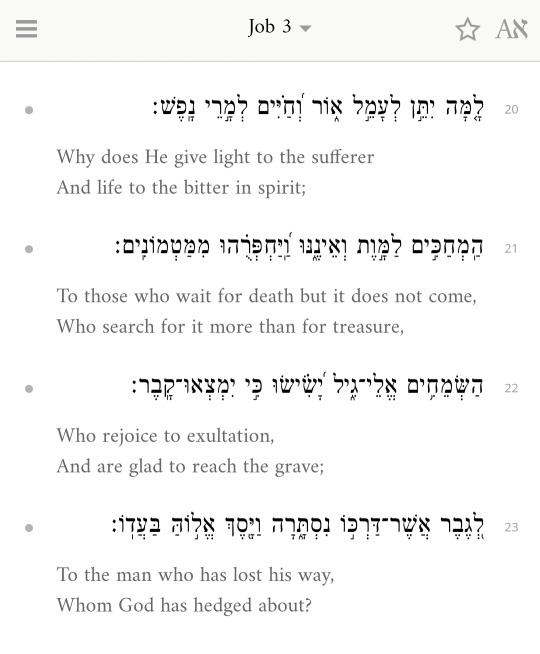
So Job does lose his faith, because as far as he can tell, he has never done anything wrong in his life ever, and yet he has been cursed to grieve everything he has ever had, and he won't even die.
Most of the book is dedicated to dialogue between himself and three of his friends, who come to the common conclusion that he must have done something wrong to deserve this treatment. But Job remains adamant: I did not deserve this.
The general lesson that many people take from this book is that God works in mysterious ways, blah blah. But like... We know, in fact, exactly why this story happened. We saw it! We saw Satan advocate to try Job! So what's the point of the book?
The point is the Job keeps asking "why". The point is that Job hears that God won't forgive his friends, despite the fact they blame him for his misfortune, and he still chooses to pray for them. The point is that he refuses to take what has happened to him quietly. Not accepting that what happened to him was just, but not accepting others' injustice either.
Ugh. I phrased all of this way better in the first draft. I really truly hate this.
Anyway my point is that Job, despite being far richer than the average Jew by the standards of his time, actually is meant to represent a very common situation: what do you when bad things happen. Do you blame yourself, or do you blame God? Do you let other people beat you when you're down, or do you stand up for yourself?
And the thing is those themes are universal, but they're not really related to Peter Parker in particular. In the shallowest sense, the kind I used to compare Cap and David or Superman and Moses, they do not have similar stories or backgrounds. Job has everything, and he loses it all, and he mourns all of it, including the property and money; Peter Parker is working class, has never had enough money, but we see again and again that he views it as a tool rather than a goal in and of itself. Spider-Man's origin is about learning to battle your yetzer hara, your darkest impulses, and we see Peter again and again trying to do his best even though he's often being pulled by his instincts to use his power for selfish purposes. Job does not ever have to learn any such lesson; he never did anything wrong.
The one thing in common between the two stories is that they both believe that every life has value - well, if Peter is being written by a competent authors at least - with Job praying to save the men who are literally called the "resha'im", the evil ones, and with Peter being the little man's hero. But that can be said about most heroes, especially the notable ones. Hell, there's an entire double page spread dedicated to the concept in Batwoman: Elegy. This is more of another indication of Jewish values making their way into the foundations of superhero comics than it is a similarity between Job and Peter.
Also, I feel like I need to be clear. Our prayers thanking God for creating something? Traditionally are simply thanking God for creating something. I'm not saying you can't interpret it as a metaphor for the world if that's what works for you, if that's how you see God, but God was very literal to most Jews for thousands of years, and I could talk for ages and ages about the schools of thought regarding God and the world and Maimonides and shit.
Speaking of which, we need to discuss the fact that Job is literally just some guy. Like he's not a prophet, he's not a leader or a judge, he's just some rich dude who lost everything, mourned it, and then got it all back. I've talked about this before, but one of the foundational ideas of my thesis is that the similarity between prophets having powers (such as Samson but also really any judge being considered a higher authority despite not even communing directly with God) and superheroes invokes Maimonides' claim that the first degree of prophecy is the need to act for the better good, being unable to ignore the ills of the world and doing your best to fix them - that people who incapable of ignoring that urge (and Peter, despite his occasional selfishness, often prioritizes Spider-Man in his life specifically because of that urge) are possessed by the spirit of God. Literal prophecy, communing with God, cannot exist without this base level. So, in effect, Peter is significantly holier than Job.
Anyway. Again, I've definitely missed some points because of Tumblr's fuck up and I intentionally skipped most of the history lesson that gave a lot of context which I didn't feel like typing up again, but this is most of it. Sorry if this wasn't what you hoped for, but this was a really interesting thing to talk about anyway, and I'm very grateful you gave me the opportunity to think it over.
#spiderman#jew tag#jewish superheroes#jumblr#judaism#marvel comics#marvel#peter parker#gail speaks#ask#anonymous
219 notes
·
View notes
Note
can i ask for your thoughts on the netflix atla adaption? 👉👈 value ur opinion on media
aw, thank you!!! i admit i'm only halfway through watching s1, so my opinions may change as i reach the end of the season, but i can outline some of my thoughts so far!
pros:
overall, with a few exceptions, i think the casting so far is really solid. the asian and indigenous representation within the show is something they clearly took very seriously, and it shows! especially for a netflix show, that's something really groundbreaking and important and refreshing to see; and obviously a huge improvement on past whitewashed adaptations. overall, i think most of the effects are good, despite some weird cinematography choices — there are a handful of moments where the CGI looks particularly egregious, but overall, the bending and choreo look COOL. the opening scene of the pilot had me by the throat, even as it made very clear what a different kind of adaptation this would be. overall, i tend not to be too fussy about an adaptation altering things from originals to make more sense in different formats (with caveats, as i'll mention in the cons lol), so i wasn't mad about the way they've fused some of the storylines to make it flow better in a 60-minute format. (although i do question bringing in s2 stories so early, such as the secret tunnel.) there have been some moments where they've either built out character relationships (like zuko and iroh) or brought in supplementary canon from korra and the comics, which i have also enjoyed as a huge fan of the original. there are a few additions that i've really loved and had fun with — zuko's dream journal, for one, lmao, and his and aang's street fight in omashu.
cons:
honestly, my biggest gripe so far has been the alterations to characterization and character motivation. the cast and crew were sort of smugly talking about removing misogyny from the original and "updating" it, which is ironic because i think the live action is actually more sexist in many ways.
my BIGGEST disappointment has been katara, with no shade to the actor. this is one of the characters who means the most to me from the original, and the character that has hands-down been the least recognizable in natla. her fire, her temper, her unruliness, and her bossiness — all to say, her human traits — have been completely sanitized, presumably to avoid drawing any kind of criticism that she's "annoying." her anger is quite literally what kickstarts the entire show: katara losing her temper with sokka cracks open the iceberg that releases aang. katara's anger is, in a lot of ways, an outlet not only for her sense of injustice in the world, but also an outlet for coping with 1) immense colonial trauma and 2) the burden of being parentified. this, in my view, is IMPORTANT for young girls and particularly young girls of color to see — that anger doesn't have to be something you shy away from, but that you can embrace as a weapon of resistance. this anger is missing entirely, except in small snatches, from natla katara. the moments that make katara a flawed, interesting character — such as her stealing the waterbending scroll and getting jealous of aang's natural prowess — have been scrubbed completely. it is nearly impossible, at this point, to imagine this version of katara bloodbending or taking vengeance for her mother in s3. i think the re-characterization is a big misstep, due more to poor writing than anything. even the agency of katara's bending is "unlocked" and coached by male characters like aang (ep 1) and jet (ep 3), when katara is supposed to be the one teaching aang!
the inversion of sokka and katara's relationship — that is to say, parentifying sokka and making katara more of a "little sister" figure — is also a huge misstep IMO, because it misses a lot of the characterization fundamental to katara's arcs in the original, and even her later conflicts with other characters like toph. in s3 in the original, sokka says when he pictures his mother, he can only picture katara's face — this is, again, a central aspect to their dynamic and to katara's character! my guess is that they removed katara's overmothering qualities to avoid accusations of being anti-feminist, but ironically, by not acknowledging that in-text the way the original does, it bakes misogyny unspokenly into the atla world rather than explicitly acknowledging and challenging it. to clarify again, i have NOT seen the end of the season yet — i am curious what they do with katara's confrontation with paku, which is one of the biggest grapplings with misogyny in the original text. but for me, removing katara's motherly qualities/parentification, and above all her unsavory traits, are not accomplishing anti-sexist work the way the writers think they're doing, but rather sanitizing the original's social commentary on gender altogether.
one of my biggest squicks thus far has been suki and sokka's relationship; i saw suki's characterization described by someone here as a farmer girl p*rn trope where a naive village waif looks to a man to show her the outside world, or w/e, and i hate that this is what they did to suki's character. they keep her warrior qualities, yes, but this is undercut for me by the cringe comphet romance tropes of making her a wide-eyed blushing virgin around sokka. the insta-romance in the original makes more sense to me, obviously because of the format, but because in the span of 20 minutes, suki has taught sokka what it is to respect and reevaluate his relationship with women and femininity. the writers bragged about removing this from the natla representation, so what we have now is that suki doesn't really teach sokka anything substantial about himself, other than some moves. rather, it's sokka teaching suki about what it is to be "worldly" and how to unlock carnal desires. tbh, i hate that! lol! but that's just my onion.
zuko has been one of the strongest and most well-acted characterizations by far, but i do have a gripe with how they shifted his primary motivation from regaining his honor to reclaiming the throne. zuko at his essence has never been a power-hungry character. his entire drive, as we are told exhaustively through both the show and memes of the original, is regaining his honor — which is also an important cultural trope for many japanese warrior characters (though others not me can speak far more in-depth to this). his search for lost honor is incredibly important, if not central, to his entire character arc, which is zuko discovering that his honor does not come by acknowledgement from his abusive family or even imperial power, but through his own integrity and ethical code. so to have him make several lines about rightfully regaining what's his, the throne, and to make that the primary point of contention between him and azula.....is a misunderstanding, again, of the crucial aspects of zuko's character.
my other nitpicks with the characters are smaller — i miss sokka's slapstick, which has been substituted with very dry humor (and i understand this makes more sense for live action). i am still on the fence about how i feel about making ozai and azula such central characters in s1; i understand why they felt this was necessary for live action, but having those two be shadow figures in the original s1 was a really cool narrative effect for not only establishing zuko initially as a villain within his own right, but for building narrative suspense as to the fire nation's motivations.
ultimately, there's just some secret x ingredient that's missing from the live action that the original nailed effortlessly — maybe it's the sense of fun and wonder? i haven't really had fun watching this adaptation; i'm more just spectating, like watching some pretty fireworks before i move on with my day. my opinion may change slightly, as i hear the show is stronger in the second half; i wouldn't even say it's a BAD adaptation, but overall i feel like it's just kinda....meh, and i still question why it needs to exist in the first place when there are some things that animation as a medium just does far better.
also i just want to point out that i find it extremely frustrating that this show leans very hard into showing the atrocities and Moral Evil of genocide in literally the first 20 minutes of episode 1 and that while netflix wants the virtue-signaling brownie points for that, they'll still continue to give giant paychecks and platforms to brazen zionists. because after this dies down, the stranger things promo cycle is going to start up.
18 notes
·
View notes
Photo
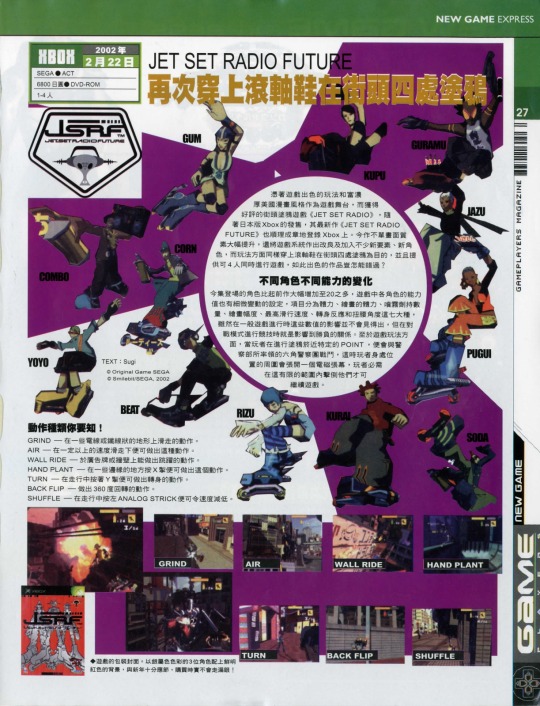
New Game Express - Jet Set Radio Future on Game Players Vol.28 (Video Game magazine) (Hong Kong, 2002)
XBOX
February 22, 2002
SEGA ACT
6800 Yen DVD-ROM
1-4 Players
Graffiti on the street again with the boots on
The street graffiti game "JET SET RADIO", which has been well-received for its excellent gameplay and rich American comic style as the game stage, has been launched with the release of the Japanese version of Xbox, and its latest work "JET SET RADIO FUTURE" is also logically registered on the Xbox. This game not only greatly improves the picture quality, but also improves the game system and adds many new elements and new characters. In terms of gameplay, it also aims to put on roller shoes and graffiti around the streets, and it also provides 4 people to play the game at the same time. How can such an excellent work be missed?
Changes in different abilities of different roles
The number of characters appearing in this episode has greatly increased to 20 compared to the previous one, and the ability values of each character in the game have also been slightly changed. The items are divided into physical strength, spray amount, painting range, maximum gliding speed, turning reaction and waist twisting The seven angles, although the influence of these values in the normal game is not obvious, but in the battle mode, it will affect the relationship between victory and defeat. As for the gameplay, when the player is graffiti near a specific POINT, he will fight with the hexagonal police group led by the police department. At this time, an electromagnetic curtain will be opened around the player's position, and the player must knock them down within this limited range to continue the game.
Action types you need to know!
GRIND - The action of sliding on some wire or wire-like terrain.
AIR - This action can be made by sliding down at a certain speed.
WALL RIDE - You can jump on billboards or walls.
HAND PLANT - Press the X button on some green side to make this action.
TURN - Press the Y button while walking to turn around.
BACK FLIP - Make a 360-degree turn.
SHUFFLE - Press the left ANALOG STRICK during walking to reduce the speed.
The game's packaging cover. The 3 characters in silver color with a bright red background are very festive for the New Year, so you won't miss it when you buy it!
66 notes
·
View notes